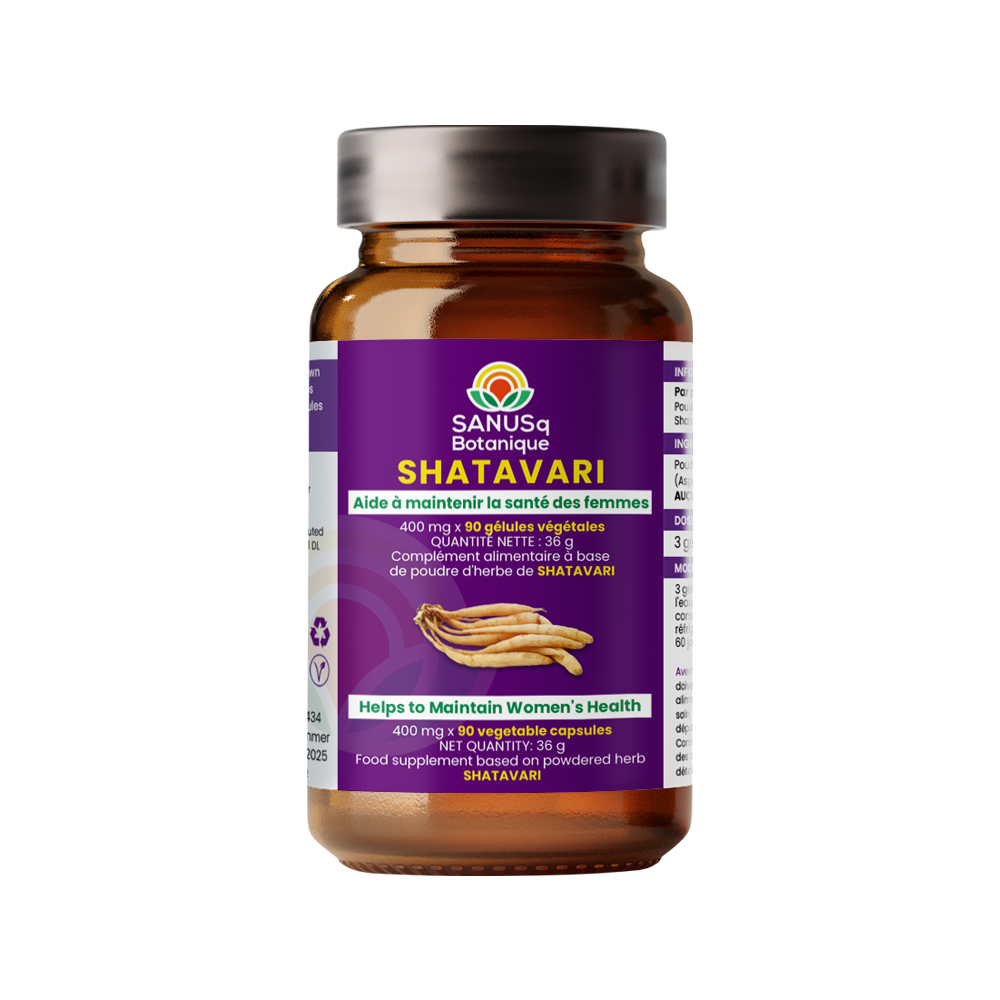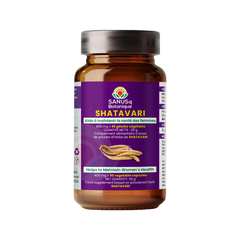SANUSq Health: Shatavari (Asparagus Racemosus) in vegetable capsules - 400 mg x 90
Helps to maintain women's health
Current batch best before date: Product discontinued
Country of origin: India
(Check our current promotions before buying)
Main ingredients: (per capsule) 400 mg organically grown Shatavari (Asparagus racemosus) in vegetable capsules. Refer to label for full list of ingredients.
Suggested daily dosage: 3 capsules per day with food and water for at least 3 months or as directed by your healthcare professional.
Storage: Refrigerate after opening. Use within 60 days. Keep well sealed.
------------------------------
Product Description
- 1,200mg of Shatavari (Asparagus Racemosus) per serving
- 90 vegetable capsules per bottle
- Non-GMO, 100% organic and pesticide free
- No additives or synthetic ingredients
- Screw top glass bottle
- Hormone balancing properties
- Reduces symptoms of menopause
What is Shatavari?
Shatavari is a plant found throughout India and its dried roots are used for its medicinal and therapeutic benefits. In ayurvedic system of medicine, it is considered as a general tonic for health, and particularly useful for female reproductive health. The root of shatavari has been traditionally used in inflammation, infectious diseases, gastric ulcers, and in improving women's health and boosting fertility in women.
This rejuvenating herb is also known as "Queen of Herbs" and is mostly known for its nourishing role in female's health problems. Shatavari is an adaptogen, meaning it helps manage stress, supports adrenal glands, corrects hormonal imbalances and boosts immunity. One of the most important bioactive compounds present in the roots of shatavari are steroidal saponins (or Shatavarins).
Health Benefits in a Nutshell
- Works as a tonic for women
- Improves reproductive health in women
- Maintains healthy hormonal balance
- Beneficial for menopausal women
- Helps in endometriosis
- Improves bone health
- Relieves PMS symptoms
- Regulates periods
- Helpful in Polycystic Ovary Syndrome (PCOS)
- Reduces stress and anxiety

Health Benefits
1. Improves reproductive health in women
Shatavari is known as a female tonic that is very effective in supporting and nourishing the female reproductive system, from puberty to menopause. It has been traditionally used for centuries to maintain hormonal balance across all ages, improve the production of breast milk in lactating women, boost fertility and vitality in women, and reduce symptoms of PMS and menopause. Shatavari powder made from the roots has been found very effective in conditions such as endometriosis (where the tissue lining the uterus starts to grow outside the uterus, causing pain, irregular periods and fertility problems), osteoporosis and polycystic ovarian syndrome (PCOS) and infertility.
2. Works as an antioxidant in the body
The root of shatavari plant contains a number of antioxidant compounds, such as racemofuran, asparagine A, and racemose.
It is believed that any kind of stress (psychological, physical and physiological) increases the production of free radicals, leading to oxidative damage and reproductive health disorders in women – including infertility, hormonal imbalances, poor quality of eggs and PCOS.
Research suggests that one of the possible mechanisms through which shatavari may work in improving women’s reproductive health is by reducing oxidative stress and increasing antioxidant status of the body. [1]
3. Improves lactation
Shatavari has galactagogue properties, meaning it can improve the production of breast milk in nursing women. Shatavari contains steroidal saponins and increases the production of the hormone prolactin, properties that are believed to boost breast milk production.
4. Helps in managing menopause symptoms
Shatavari is an adaptogen that cools the body and supports hormonal balance in women, both during menstruation and menopause. The herb is rich in phytoestrogens, plant based bioactive compounds with oestrogen like properties. Small scale studies show that shatavari may help manage symptoms, such as hot flushes and night sweats in menopausal women. It supports bone health and may reduce the risk of osteoporosis, a well-known risk in post-menopausal women. Shatavari also moistens tissues, which helps reduce vaginal dryness in menopausal women.
5. Helpful in menstrual problems
Shatavari is cooling and nourishing in nature and balances hormones. Shatavari supplements are known to be immensely beneficial in reducing the symptoms associated with premenstrual syndrome (PMS), such as menstrual cramps. Known to improve strength, vitality and fertility in women, shatavari is also useful in irregular periods. It regulates the menstrual cycle, and reduces abnormal or heavy bleeding. It is also a good source of vitamins and minerals, that makes this plant useful in reducing fatigue and weakness in women.
6. Reducing symptoms of PCOS
Shatavari is a very promising herb when it comes to managing Polycystic Ovary Syndrome (PCOS) and its symptoms such as irregular periods, abnormal blood flow, poor mood and hot flushes. Shatavari corrects hormonal imbalances, the root cause of PCOS. It is even used to prevent the production of new cysts.
7. Nourishes the digestive tract
While shatavari is considered to be a nourishing and rejuvenating herb for women’s reproductive system, it also soothes the digestive tract. In Ayurveda, shatavari is used to heal gastric ulcers, and research suggests that it increases the secretion of mucus in the stomach and also reduces the levels of acids, reducing acidity in the stomach.
Other health benefits
- May help in alcohol withdrawal
- Helps reduce anxiety
- May help reduce kidney stones
- May help manage type 2 diabetes
- Reduces hair loss
Precautions
Shatavari or A. racemosus is known to be completely safe for long-term use. Do not exceed recommended dosage and always consult your healthcare practitioner before you start taking shatavari in any form.
- Shatavari can cause allergic reactions, such as rash, itchy skin, itchy eyes and trouble breathing, in some people. Those who are allergic to asparagus should avoid taking shatavari supplements.
- Anyone taking diuretic medication should avoid taking shatavari supplements.
- People taking medications or herbal remedies to lower blood sugar should refrain from taking shatavari.
- Not recommended for those with oestrogen sensitivities.
- Not recommend for people with asthma and congestion.
- Shatavari supplements can cause weight gain.
References:
- Pandey et al. Impact of stress on female reproductive health disorders: Possible beneficial effects of shatavari (Asparagus racemosus). Biomed Pharmacother. 2018
Disclaimer
Information on our websites, in our blogs and our emails are provided for informational purposes only, and have not been evaluated by the EMA, EFSA or FDA. It is not meant to substitute medical advice provided by your healthcare professional and is not intended to diagnose, treat, cure, or prevent any disease. Our products are intended for adults, 18 years of age and older. While Shatavari has been shown to have various health benefits, it is important to remember that supplements and dietary changes should be considered as part of an overall health plan and not as a substitute for professional medical treatment. Only a qualified healthcare practitioner can provide personalized advice and treatment plans based on your individual health needs and medical history, and you should seek advice from your healthcare professional before taking product(s) if you are pregnant or nursing.









 Pin it
Pin it